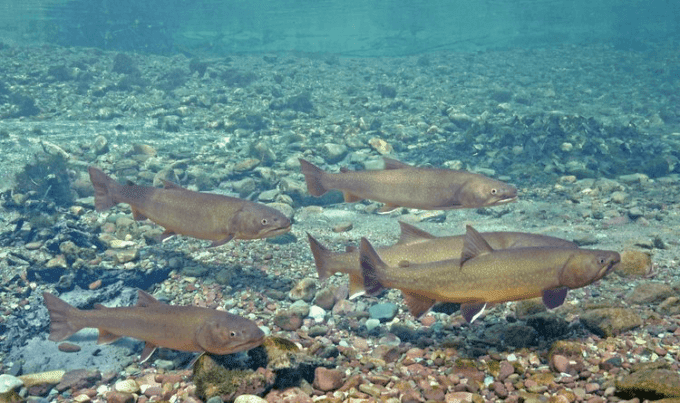Lawsuit says FWP is harming the public and fishers by not asserting water rights it possesses on behalf of the public
BY: KEILA SZPALLER-AUGUST 13, 2025 4:47 PM

Bull trout (Photo by Pat Clayton, used with permission) (via Daily Montanan)
Montana Fish, Wildlife and Parks is failing to enforce water rights on behalf of the public to the detriment of rivers and healthy aquatic life including wild trout — and contrary to its constitutional duty — alleges a new lawsuit.
Last week, Upper Missouri Waterkeeper, Alliance for the Wild Rockies and Save the Bull Trout filed a complaint in Lewis and Clark County District Court asking a judge to find the state is failing in its duty to enforce its water rights.
The lawsuit asks the court to declare FWP is negligent in its duty to “maintain and improve a clean and healthful environment” as the state Constitution mandates by not asserting its water rights.
The complaint also asks the court to find FWP’s new protocol for stream flows under the Gov. Greg Gianforte administration is unscientific and is being used unlawfully.
It also alleges the protocol for determining water flow, created outside the rulemaking process, hinders the agency from exercising its constitutional duty to protect aquatic life.
FWP declined to comment on the lawsuit, and the Governor’s Office said FWP would speak for the administration.
“FWP is reviewing the complaint, but seeing as this is active litigation, we do not have a comment at this time,” said an FWP spokesperson.
However, Guy Alsentzer, executive director of the Upper Missouri Waterkeeper, said FWP doesn’t have a choice when it comes to protecting the public trust — it has a constitutional duty.
“Montana’s rivers are incredibly stressed — from extreme drought, unchecked pollution, and declining fish populations — yet the very agency tasked with protecting healthy fish and wildlife is choosing politics over science,” Alsentzer said in a statement. “At the moment when our rivers and streams need water the most, Fish, Wildlife and Parks has refused to act.”
Montana is experiencing “its most extreme drought on record,” and also its greatest demand, the lawsuit said. Citing the U.S. Drought Monitor, it said 82% of the state was experiencing drought conditions as of June.
Water rights possessed by FWP are “held in trust for the public, to protect aquatic life and recreation,” and they can help mitigate harms to fish, the lawsuit said.
However, the lawsuit alleges FWP has been leaving those rights unused, harming fisheries and the public as a result.
“While the state’s cold-water fisheries are the envy of the world, Montana’s iconic trout
species are almost universally experiencing population-level declines,” the lawsuit said.
It said the impacts could be costly; citing a scientific study, the lawsuit said cold-water sections of water generate $500,000 a year per kilometer, but cool-water sections generate just $60,000 by comparison, “primarily due to the preference for cold-water by nonresident fishers.”
In 2021, a conservation specialist at FWP was getting ready to call in water rights on the Smith River and the Shields River, as the agency has done in the past, the lawsuit said.
But that year, the Governor’s Office intervened, “wanting to know the names and types of water users that would be affected and asking for proof of how the call would provide benefit to the stream,” the complaint said.
For a variety of reasons, an FWP manager explained in a July 1, 2021, memo that FWP couldn’t definitively prove the benefit, given, for example, that some junior water rights users might not have been using water to begin with and would have nothing to add, the lawsuit said.
On July 7, 2021, Gov. Gianforte sent a letter to then-FWP Director Hank Worsech directing the agency to “forgo a call for water” on those rivers, the lawsuit said, quoting the correspondence.
Following public outcry in 2021, FWP issued a new Water Right Call Protocol in 2022, but the protocol is problematic in a number of ways, the complaint said.
The protocol fails to examine how aquatic life or recreational uses are protected, the lawsuit said, and it wasn’t created using the right procedures anyway, through rulemaking under the Montana Administrative Procedures Act.
In failing to assert its water rights, the complaint alleges FWP is harming the public’s ability to “fish, float, view and photograph scenery and wildlife, and engage in other vocational, scientific, spiritual and recreational activities which rely on healthy aquatic ecosystems.”
It also said the framers of the Montana Constitution meant it to be proactive in its environmental protections, as the Montana Supreme Court has concluded in other cases.
“Our constitution does not require that dead fish float on the surface of our state’s rivers and streams before its farsighted environmental protections can be invoked,” the lawsuit said, citing an earlier state Supreme Court opinion.
It also said the rights of the public and future generations under the Public Trust Doctrine predate the Montana Constitution, and the doctrine “imbues the state with a fiduciary duty to protect and conserve common pool natural resources, particularly water, for public benefit.”
Additionally, the lawsuit said Montana law “roundly recognizes” that the public’s property rights in water can be lost if they are not exercised and protected.
The complaint also points to findings of fact about the effects of climate change that were not challenged on appeal in Held vs. Montana. In the historic youth climate case, the Lewis and Clark County District Court found, and Montana Supreme Court affirmed, the state’s failure to consider greenhouse gas emissions violates the constitution’s protection of a clean and healthful environment.
“Anthropogenic climate change is disrupting the natural range of variation in the flow paths of Montana’s river systems,” the lawsuit said. “Compared to the 1960s, the summer streamflow … in Montana’s rivers has decreased by approximately 20% and stream temperatures have increased between 1-2 degrees C.”
The current complaint requests the court find Montanans’ constitutional right to a clean and healthful environment include healthy rivers with minimum stream flows that sustain aquatic life and fish; that FWP’s failure to assert its water rights violates its constitutional duty and breaches its obligation as a “trustee” of the public trust; and that FWP’s new protocol is unlawful and should be vacated.
See more at Daily Montanan.
Complaint-for-Declaratory-and-Injunctive-Relief-8.8.2025